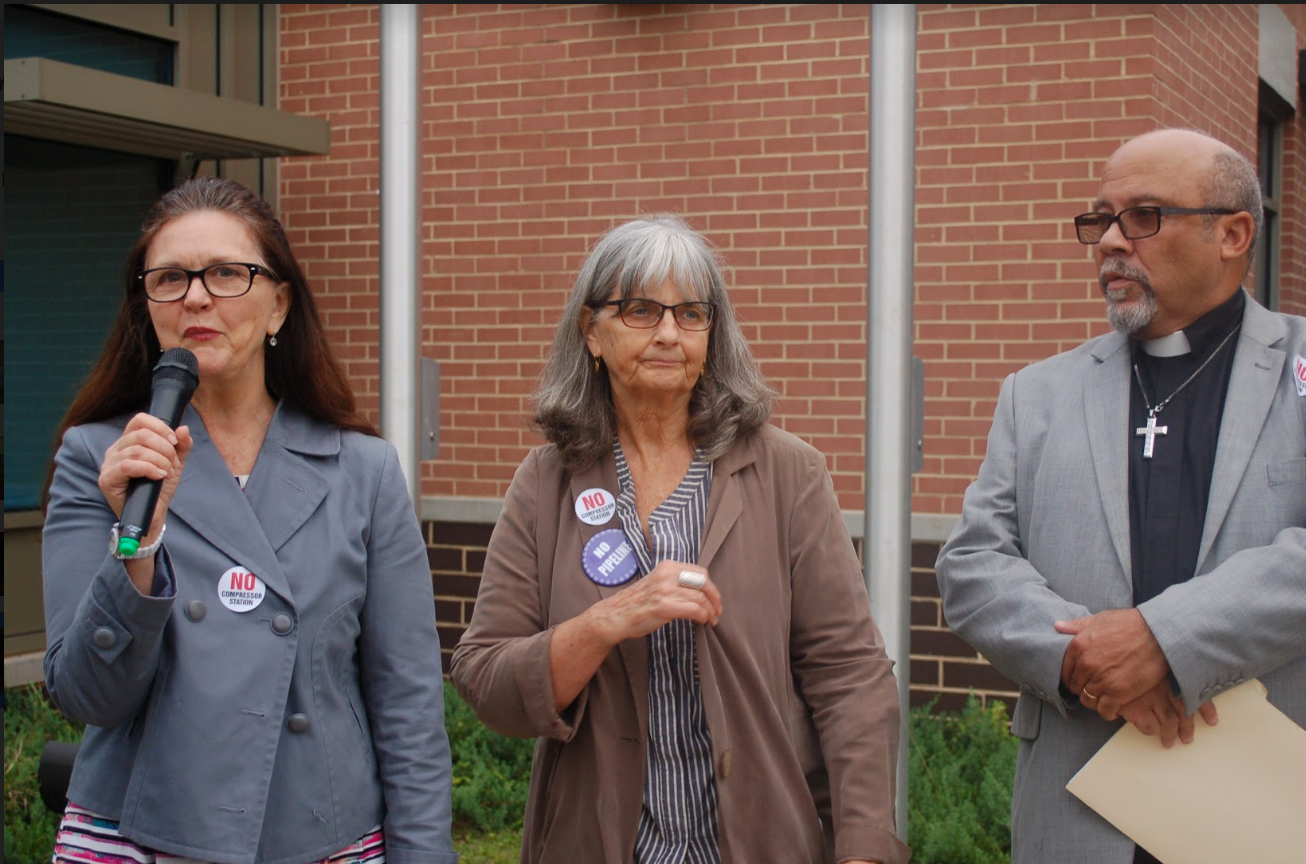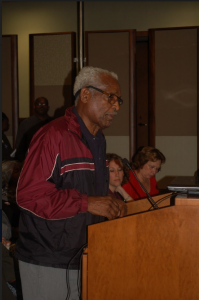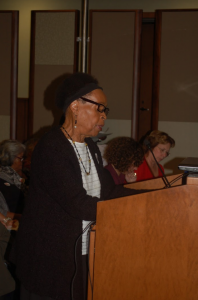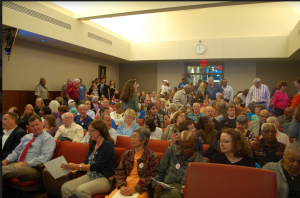More expected to speak: Continued compressor hearing is Oct. 17 at 6 p.m.
Published 7:19 pm Wednesday, September 28, 2016

- JORDAN MILES | HERALD Before the hearing began, groups in opposition to the compressor station held a press conference, detailing concerns and criticisms of the station. Pictured are, from left, Lakshmi Fjord, a founding member of Yogaville; Chad Oba, chair of Friends of Buckingham; and Paul Wilson, pastor of Union Hill and Union Grove Baptist churches.
More than 25 people are expected to participate in a continued public hearing Monday, Oct. 17 regarding a special use permit request for a proposed 53,515 horsepower (hp) natural gas fired compressor station in Buckingham.
The October hearing follows a heated public hearing Monday night before the county’s planning commission. There, 28 people blasted and scrutinized the proposed station and the Atlantic Coast Pipeline Project 600-mile natural gas pipeline that, if approved by federal regulators, would span Buckingham County.
County officials said 54 people signed up for Monday’s standing-room only hearing. Because of the number of participants, the commission decided to recess at 10:30 p.m. and resume the hearing at its Oct. 17 meeting at the County Administration Complex on Route 60.

JORDAN MILES | HERALD
Retired educator Charles White said his neighbors in the Union Hill community were concerned about the possible “catastrophic” incidents that could come from the compressor station.
On Monday, no one spoke in favor of the station or the pipeline project — a joint venture being led by Dominion as Atlantic Coast Pipeline (ACP) LLC.
Many of the speakers said they lived in the area where the station would be built — on Route 56 between Union Hill and Shelton Store roads — and asked the commission to deny the permit application.
In a presentation before the hearing began, Dominion representative Carla Picard focused on safety, air quality, noise abatement and compatibility with surrounding uses and conformance to the county’s Comprehensive Plan.
Claiming safety is Dominion’s No. 1 priority, Picard said the energy firm complies, and, in most cases, exceeds requirements set forth by the federal government “and other applicable regulations, standards and guidelines for safety.”
She said the facility would be equipped with an emergency shutdown system (which stops engines and isolates and vents compressor piping) and be remotely controlled 24/7 by a gas control center and remote-controlled shut-off valves.
“The (state) permit levels are calculated at the maximum possible operating conditions,” Picard said of air emissions from the facility. “Of course, what actually happens day to day would be lower than that.”

JORDAN MILES | HERALD
Marie Gillespie, who lives on Union Hill Road, questioned the effects of the air emissions from the station.
According to Picard’s presentation, the largest amount of pollutant from the station, measured in tons per year, and based on all compressor units running constantly at 8,670 hours per year at the maximum operating load, would be carbon monoxide at 95.2 tons per year. Citing a government study from 2011, Buckingham County currently sees 5,577.8 tons per year of carbon monoxide.
About 88 tons per year of particulate matter — which speakers cited as a health risk — would be emitted by the station. According to the government study, Buckingham currently sees 1,747.6 tons per year of the pollutant (both inhalable and fine).
“You can see that this compressor station is a relatively small fraction of the pristine air that we breathe today,” Picard said.
In addition, she said the facility’s environmental controls will include a fugitive emissions reduction initiative; a system to reduce nitrogen oxide emissions; a catalyst to reduce carbon monoxide and volatile organic compound emissions; venting gas recovery compressors to significantly reduce the release of methane; and plans for erosion and sediment, stormwater and spill prevention.
According to a Dominion-led sound study, the closest residence to the proposed station (1,450 feet from the station) would have an increase of 2.9 dBA — or decibel sound levels — totaling 47.5 dBA with the compressor station and ambient noise. Sound levels from a station must be below 55 dBA at noise sensitive areas, or homes, according to federal regulations.

JORDAN MILES | HERALD
There was standing room only as every seat was filled during the planning commission’s Monday hearing on the proposed 53,515 horsepower (hp) compressor station.
Picard said the station’s equipment is designed to minimize noise, and includes blowdown silencers that will minimize venting noise.
According to her presentation, the station “will have minimal impact on surrounding rural uses,” adding that a vegetative buffer along the perimeter of the station’s property would block visibility from the highway and adjacent properties.
“In the first eight years that the compressor station is operational, Buckingham County would see approximately $8.7 million in incremental tax revenue,” Picard said.
She said about $798,000 in tax revenue (about 60 percent of overall revenue from the project) would come to the county from the pipeline during 2022, the first year the ACP is fully operational. About 40 percent, or about $538,000, would come from the compressor station, Picard said.
Charles White, who said he’s lived in the county for 58 years, said there was concern about a catastrophic event taking place as a result of the location of the station in the community. “What’s going to happen next?” White, who lives on Shelton Store Road, asked commissioners.
Adrian Jones, who lives on Union Hill Road, said Dominion’s information was “out of date,” and questioned the effect the station would have on property values, citing concerns about residents in the area who have medical conditions.
“We’re concerned about our future,” he said.
Marie Gillespie, who lives on Union Hill Road, said her house was one of the closest to the proposed station.
“This is agricultural land, not industrial,” she told commissioners. “Do we really know the effects of this?”
Ella Rose said her home is closest to the property purchased for the compressor station and Dominion has yet to contact her about the proposal.
“I am used to the quiet,” she said, adding, “This is not the plan I had for my retirement … Our lives shall not be sacrificed.”
John Laury, a Union Hill Road resident, said the station and its effects would “take away our greatest joy of living,” citing the potential noise impacts from the facility.
Swami Dayananda, who lives in Yogaville — a spiritual community near the proposed path of the ACP — said 60-75 percent of all damages from natural gas activities come in the form of health problems.
“Choose the health of our people over tax revenue,” she said.
Peter Bruns, who described himself as a fifth-generation Buckingham landowner, said the project was “mostly about profits,” and told planners, “Don’t give them the goldmine and give us the shaft.”
Friends of Buckingham Chair Chad Oba, whose group opposes the project, said members are among the stakeholders in the community.
“We care because it is where we live,” Oba said.
Detailing mental health impacts of the project, she said there was a high level of anxiety among those living in the area of the proposed station.
During the meeting, planners agreed a recommendation to the county board of supervisors on the permit application would come during their Monday, Oct. 24 meeting, which begins at 7 p.m.
The commission has placed 32 conditions on the permit — which could be amended — that address construction and operating noise, horsepower rating, uses of the property, exterior and site lighting, location on the property, fencing, buffers, silencers, site plan approval and permitting.
“We understand that there are some misconceptions out there,” Dominion spokesman Aaron Ruby said regarding air quality, noise and visual impacts from the proposed station.
He said ACP must receive air quality permits to operate the station, noting air emissions will fall below the state’s regulatory limits.
“Residents in the community should feel reassured that we’re protecting their health and the environment in the community,” he said. “Our emissions are very minor when compared to the existing emissions in Buckingham County today … I hope that the commissioners and the folks in the county keep an open mind.”
He said those who live in the community “aren’t going to see the compressor station and aren’t going to hear the compressor station.”





